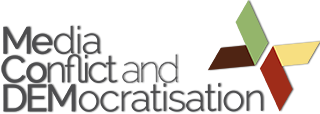A Policy Brief by Ines Drefs and Barbara Thomass is now available.
Download at: http://www.mecodem.eu/publications/working-papers
Executive Summary
This policy brief puts forward suggestions for improved journalism support in the context of democratisation conflicts. It draws conclusions from interviews with journalists and media development actors.
Journalists in conflict societies frequently face critical working conditions. Our interviews with journalists from Egypt, Kenya, Serbia and South Africa identify political pressure and socio-economic insecurity, a lack of formal in-house training and juniorisation within the newsroom as well as exposure to violence, attempts at interference and a lack of resources on the ground. Trauma and ethical dilemmas create problems in all case study countries (see section 2).
Media development organisations regard polarisation and a lack of ethical standards as the main problems in conflict societies. Our interviews with both Europe-based and local media development actors show that their support programmes address journalists as enablers of an inclusive public discourse and as proponents of the human right to freedom of expression. Assistance for journalists increasingly considers the bigger newsroom structure, taking the form of long term counselling or mentoring and often focusing on professional standards and ethics (see section 3).
In addition, media development actors emphasise a need for increased coordination and cooperation within the sector, higher prioritisation of media development in foreign policy and a more thorough understanding of local conditions before commencing engagement on the ground (see section 4).
In view of these findings, this policy brief concludes with concrete recommendations as to how media development efforts can be better geared to the realities of conflict reporting, thus enhancing the effectiveness of support measures (see section 5).
The recommendations in brief:
• To consider the safety of journalists
• To take local conditions as a starting point
• To intensify research and evaluation activities
• To involve multiple stakeholders and facilitate exchange
• To prioritise long-term formats
• To make allowance for flexible budgets in media development projects
• To establish learning and exchange mechanisms between the various organisations that are active on the ground
• To apply a qualitative approach for evaluating media development projects
